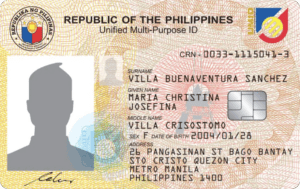What is the UMID Card and How to Get It
The UMID card (Unified Multi-Purpose ID) in the Philippines is a government-issued identification card that serves multiple purposes. It was introduced in 2010 to streamline the identification processes across various government agencies, including the Social Security System (SSS), Government Service Insurance System (GSIS), Philippine Health Insurance Corporation (PhilHealth), and the Pag-IBIG Fund (Home Development Mutual Fund).

Key Features of the UMID Card
- Multi-Agency Use: The UMID card is accepted across multiple government agencies, reducing the need for citizens to carry several identification documents.
- Eligibility: To apply for a UMID card, individuals must be members of the SSS or GSIS, or have contributions to PhilHealth or Pag-IBIG. It’s available to those who have at least one posted contribution to the SSS.
- Application Process: The application for a UMID card can be done online through the My.SSS portal or in person at designated SSS branches. Applicants need to provide basic personal information and supporting documents.
- Cost: The UMID card is issued free of charge, making it accessible to a wide range of citizens.
- Physical Features: The card includes essential personal details such as the holder’s name, date of birth, address, and a photograph. It also features a common reference number (CRN) or SSS number, which helps in identifying the cardholder across various government services.

Relation to the Social Security System
The UMID card is closely tied to the Social Security System in the Philippines. It serves as a primary identification tool for SSS members accessing social security benefits. The card simplifies the process of claiming benefits and facilitates transactions related to social security services, enhancing the efficiency of service delivery to members.
UMID Card Application Process
Step 1: Prepare the Required Documents
- Duly completed UMID Card Application Form
- One (1) valid primary ID or two (2) valid secondary IDs
- Birth certificate issued by the Philippine Statistics Authority (PSA)
- Marriage certificate (if applicable) issued by the PSA
Step 2: Get a UMID Application Form
- Download the form from the SSS website
- Request a copy from the nearest SSS branch that offers UMID enrollment
Step 3: Schedule an Online Appointment with SSS
- Log in to your My.SSS online account
- Select the option to schedule a UMID appointment
- Choose your preferred SSS branch and appointment date
Step 4: Attend Your Scheduled Appointment
- Arrive at the SSS branch at least 15 minutes before your appointment
- Bring your completed application form and valid IDs
- Wear proper attire – collared shirt/blouse, no accessories, remove glasses
- Undergo photo capture and biometrics (fingerprint, signature)
- Receive an acknowledgment stub after biometrics
Step 5: Wait for Your UMID Card
- The UMID card typically takes 30 days to process after your appointment
- You will receive a text or email notification when your card is ready for pickup
- The card will be sent to the permanent address you provided
Step 6: Claim Your UMID Card
- Go to the SSS branch where you applied within 60 days of receiving the notification
- Present the acknowledgment stub and valid ID
- Check your card details for accuracy upon claiming
Step 7: Activate Your UMID Card (if applicable)
- Visit a GSIS Wireless Activated Processing System kiosk
- Place your UMID card on the e-card reader
- Scan your pre-registered finger on the screen
- Your card will be activated within 72 hours
Remember, the UMID card application is free of charge. Replacement cards cost ₱200. For any concerns, you can check your application status at the SSS branch or by calling the UMID hotline.

UMID Card: benefits and drawbacks
| Advantages | Disadvantages |
|---|---|
| Consolidates multiple IDs into one card, reducing the need to carry several identification documents | Long processing time – it can take several months to obtain a UMID card |
| Provides a single ID for transactions with key government agencies like SSS, GSIS, PhilHealth, and Pag-IBIG | Limited availability – currently only available to eligible government employees and members of certain agencies |
| Incorporates advanced security features like biometrics (fingerprints, facial recognition) to prevent fraud | Security concerns – still susceptible to potential fraud and tampering, raising validity issues |
| Enables access to social security benefits and services through the SSS and GSIS | Restricted usage – while accepted for government transactions, not widely accepted in the private sector yet |
| Offers UMID-ATM cards that can be used for financial transactions like withdrawing money from loans and benefits | Requires in-person registration to capture biometrics – cannot be done entirely online |
| Eliminates the need for multiple ID cards and verification systems, saving costs for the government | Not available for all citizens – for example, unemployed individuals cannot obtain a UMID card |
| Provides a convenient, secure and efficient identification system for Filipino citizens | – |
Wrap-Up
The Unified Multi-Purpose ID card is a vital component of the Philippine government’s efforts to modernize and streamline public services. By consolidating various identification functions into a single card, the UMID enhances convenience for citizens while improving the efficiency of government transactions. As the Philippines continues to develop its identity management systems, the UMID card stands out as a significant advancement in providing accessible and reliable services to its citizens.